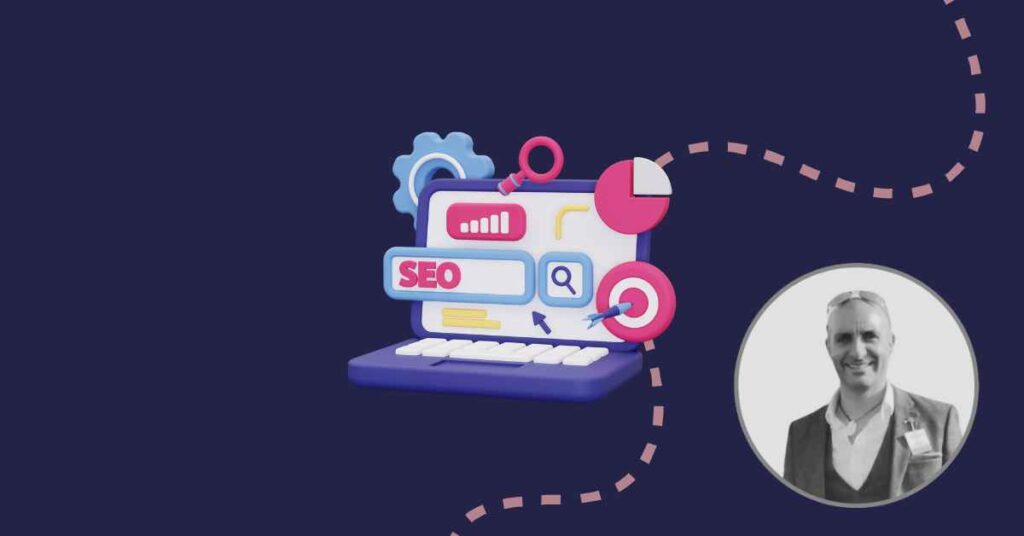SEO Myths Debunked: Fact vs. Fiction
In this article, I will explain what is SEO and why it is so important. And what are some of the biggest myths people talk about? We’ve all seen these people claim SEO is dead or it doesn’t work in the current time and so on and on. I tried to uncover all these myths to give you a clear picture of what real SEO is, SO let’s dive into it.
What is SEO?
SEO stands for search engine optimization and involves bringing more organic traffic to your website. Organic traffic is any traffic that you don’t pay for directly (You might pay for an SEO expert to optimize your site for SEO or a content writer to write blog or article content for you). For example, I searched Google for the term “digital marketing”. On the top left side of the search results, you can see that the first and second listings are ads. And below that is an organic listing. When you optimize for SEO this is where your site will appear.
So, Why SEO is important?
SEO is critical for many reasons. With my previous example of digital marketing, it is imperative to be on the first page of Google search results if your business provides digital marketing. If you don’t, you’re missing out on tons of sales.
While you can generate traffic to your website through paid advertisements like Facebook ads or Google ads, the majority of online search traffic comes from SEO and organic search results. Statistically speaking out of all searches in the US only 2.9 percent of people clicked on paid advertisements.
Uncovering SEO Myths

We’ve seen people online claiming false statements like SEO is dead, links are not important, and more. I will uncover all of those myths so you don’t fall for them and improve your website’s SEO.
SEO myth #1: Content is all you need
Content is king and it is all you need to grow your website traffic. While it is true and the content is very valuable, that isn’t the whole story. You need quality backlinks from other sites pointing to your site.
Links are important as this is how Google can identify quality content. If high domain authority websites are referring or has your link in their site Google can trust you. If that link is a do-follow backlink then you’ll get link juice too which will is a good ranking factor.
So from this perspective, this myth is false.
SEO myth #2: Page speed isn't important
This is so false; page speed is super important. It’s becoming more important every year that passes by. It boils down to user experience. Google is always looking for a better user experience for its users.
For example, you search for the term “gaming laptop”, click on a site from the listings in Google search results, and the website takes ages to load. You wait for a few seconds and it’s still loading. You lose your patience and decide to visit another site. In Google’s eyes, your website did not provide a good user experience.
As a result, Google will lower your rankings and your site’s visibility to users. Google always wants the highest possible user experience for its users. So, page speed is important.

If your page speed looks something like this, Do not expect any ranking for your website.
As of a recent survey, Amazon calculated that 1 second of site speed difference will cost the company $1.6 billion in sales. So you now know how important it is in terms of ranking and conversion factors.
SEO myth #3: Links are dead
This is what I hear often, and it is so untrue that I cannot believe it. Links are still one of the very significant parts of ranking. Links are neurons of the large web connecting all websites.
A person can be identified through the types of friends he or she has similarly Google scans your website and sees if the domains you’re connecting to are credible.
Links are of two types:
- Internal links
- External links
For your external links, just go to similar sites type in your URL for one high authority sites like (conversionai.com) and explore.

Most people think that adding a do-follow link to other site from your site is not necessary and have no ranking advantage.
But, that’s not true. It is good practice to include several external links and at least one do-follow external link.
Here are good practices to look for while linking to other sites.
- Link out to only to high content quality pages
- Link out only when necessary
- Use the brand name or URL of the site as your anchor text
- If you notify the site owner or blogger about your link to them ( you may get a natural backlink or a tweet from them)
SEO myth #4: Higher keyword density helps you rank
False: This was the case in 2011, 2012, and 2013. But back then Google’s algorithm wasn’t that strong. You could populate a bunch of keywords as many times as you could and boom you started to rank for that keyword.
In today’s world, Google’s algorithm is far smarter and more advanced, so you cannot work around these tricks. Google might even punish you for black-hat SEO. Yes, you heard that right! Keyword density is considered a black-hat SEO technique and you should avoid it at all times.
SEO myth #5: Buying Google ads helps organic traffic
False: I’ve experienced several websites myself and did not witness any assistance in that regard. They say that some of the traffic from Google ads stays or once you bring some traffic through Google ads your website improves in ranking.
Though Google ads help you to test keywords and check which ones are most effective for you. It can also allow you to optimize CTR (click-through-rate) of your business.
Buying Google ads does not increase or benefit Google’s organic search ranking.
SEO myth #6: More pages help my site rank better
This is not true as well. When it comes to ranking, quality is more significant than quantity. Adding more web pages will not improve your ranking but quality ones will. It is much better to add 3 quality pages than to add 300 low-quality pages.
This myth might originate from large websites that have thousands of pages and rank for many keywords. To clarify these websites are multi-million or even billion-dollar companies and they have a large team just to make sure they’re publishing quality content and pages.
Please focus more on quality than quantity; if you do that, you’re surely heading in the right direction.
SEO myth #7: Only the #1 Google position matters
False: It’s true that the first position on Google is a big reward. One can have a big pie of an apple all for themselves if they rank #1 on Google. But that doesn’t mean that if you’re ranking below the first position you won’t get any traffic.
Statistically speaking the #1 organic (unpaid) position gets around 33.2% of clicks. 15 to 10 percent below that and 2% at the bottom of the page. That means if you’re ranking at the bottom of the first page for a keyword that’s getting 10k monthly clicks you’ll receive 200 to 1500 clicks from a single keyword every month.

In the example above I searched for the term “digital marketing”, as you can the second positions more traffic even the first one.
So, don’t worry if you’re not the first result in the list. You’ll still receive a fair amount of traffic even if you’re second or third page of Google search results.
SEO myth #8: Buying 10,000 links for 10$
Have you ever thought “What a deal this is? I will rank my website in no time and for only 10 dollars”?
By definition the easier it is to get a backlink, the worse it is.
If you have ever considered buying links in bulk, have you ever wondered who else buys them? Well, everyone. If a link is available to everybody that’s a bad link to begin with.
Google calls these links FFA (Free-for-all) sites. These sites are loaded with porn ads, pill affiliates, and other fishy things that you don’t want your brand associated with.
In the best-case scenario, that’s worthless.
In the worst-case scenario, you might dig yourself a hole that takes years to undo.

You can see in the image above by ahrefs. There are different types of bad links and it is advised that you should consider using these methods. It loss will outweigh its benefits.
SEO myth #9: Mobile first is irrelevent
The 2018 update of the mobile-first was a big update in years.
Most people ignore this but Google has discussed mobile as a ranking factor since the 2000s.
It fits perfectly with Google’s user experience factors.
Websites are not rewarded with mobile-first as much as punished for scaling down on their mobile version pages.
All these sites are hiding some content in their mobile version. Their traffic dropped off dramatically.
SEO myth #10: SEO is one-time activity
There are two sides to SEO.
First: Do 10 to 20 best practices, optimize your site, and forget about it. This method is mostly used by agency owners and freelancers.
SEO is not a one-time activity. SEO is a competition and if you’re not updating content, making backlinks, or optimizing your site speed someone else will do and you’ll lose your position to these guys.
There are a thousand ranking factors for any site and if you’re not constantly optimizing for them, you won’t have any rankings too. It’s just that simple.
SEO myth #11: The Google sandbox effect
It is both false and true: let’s discuss this in detail
Some SEO professionals believe that new websites enter a period of poor Google ranking before ranking more freely.
SEO professionals will argue that this is what happens to new websites. However, so far Google has only provided guidance in the form of tweets.

Screenshot: Twitter – Sep 2021
Verdict: Officially it’s a myth (There is no sandbox).
Unofficially: Google might need some time to understand your content and niche before ranking you freely and unbiasedly.
SEO myth #12: Google being misunderstood
Sometimes the myth originates from Google itself.
As we mentioned earlier in this article, sometimes Google executives speak opaquely, and rarely does this lead to a false interpretation of the original fact.
If you’d like to verify this myth and avoid falling for it, follow any trusted Google representative yourself and filter any ambiguity or doubt. Or follow trusted blogs, journals, or personalities for a better and more accurate interpretation of announcements.
SEO myth #13: Duplicate content penalty
This is a myth and not a fact: The thing is that if you copy the content of some other website Google will penalize you for that.
To understand this, we have to divide this into algorithmic and manual suppressions.
Algorithmic suppression is an algorithm doing its thing. It is when your page cannot rank well for a keyword because Google filters your content as duplicate. Google finds original content more useful and trustworthy.
Plus, Google doesn’t want to rank similar content on the same page for a better user experience.
Manual action is when a page is removed from Google search results by a human representative of Google.
You’ll be notified by email through the Google search console.

It generally looks like this.
Duplicate content can grab the attention of a manual-action employee. There is the possibility that you might get removed but having one or two duplicate pages will not trigger that.
Stay ahead of SEO game
SEO is constantly changing and you should too.
Brands hire large teams to manage SEO campaigns. But it’s unclear who to trust.
Even if you’re not an SEO professional it’s important to follow updates and to make sure what is working and what is not.
Listen to Google carefully
Follow Google blogs, YouTube videos, or Twitter personalities.
Follow people like John Mueller, Gary Illyes, and Danny Sullivan. They’re providing useful information regularly.
Googlers usually don’t provide a direct answer but often hint at something to be less manipulative of their results.
Choose your SEO experts Wisely
Throughout my career, I’ve never faced an SEO expert that I completely agree with. There is always something we both see differently. I mean SEO is vague.
And every expert will talk differently and have their own story to tell. But we need to fact-check and ensure credibility.
Also, pay attention to new bloggers coming every year with tactics and strategies for SEO ranking. But realize that these guides won’t work in the real world and they’re doing that for attention and traffic.
Experimenting is the key
Keep trying
You can uncover what works for you with educated guesses and proper research. If 200 factors affect your SEO game it’s common sense to try different strategies and see which one works best for you.
For example, if you’re advised that structuring your content in a certain way will rank you better in SERPs (Search engine result page) then it’s better to test with one or two pages of your website and then go all in.
Conclusion
In SEO, smart work is more important than hard work. For example, if you’re working day and night but not following the right path you’ll end up nowhere.
That’s why I wrote this article to help debunk the SEO myths once and for all.
But you shouldn’t stop here. Reading other blogs and learning from knowledgeable content creators will help you to understand SEO in depth and uncover more hidden myths of SEO.
I hope that these thirteen SEO myths helped you improve your website and offered more smart ways to approach SEO and content creation in general. Have you faced other SEO myths before? Please let me know in the comments below.
Anyway, this is Ehsan Samadi saying Goodbye to you. We will meet in another insightful article. Till then, have a good one. Cheers
Table of Contents
Toggle



